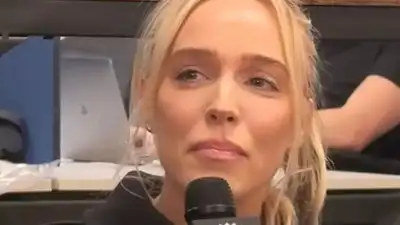ARTICLE AD BOX

‘Call Her Daddy’ podcaster Alex Cooper alleges sexual harassment by Boston University soccer coach in new docuseries
Alex Cooper, the bold and unapologetic voice behind the wildly popular podcast Call Her Daddy, has spent years giving others a platform to speak about their experiences with relationships, trauma, and empowerment. Now, in a striking shift, Cooper is using her own voice to share a deeply personal and painful story. As per reports, in the newly released two-part Hulu docuseries Call Her Alex, which premiered at the 2024 Tribeca Film Festival, Cooper publicly accuses her former Boston University soccer coach,
Nancy Feldman
, of sexual harassment. The docuseries offers a raw and emotional journey through Cooper's formative years, from her upbringing in Pennsylvania to her meteoric rise as a media mogul. But at its heart lies a harrowing narrative of power imbalance, silence, and eventual reckoning. As the series gains national attention, it marks the first time Cooper has spoken out in detail about the alleged abuse she endured while playing Division I soccer on a full-tuition scholarship—shining a light on institutional failures and the lasting impact of trauma.
Allegations against coach Nancy Feldman: “I Felt So Deeply Uncomfortable”
In Call Her Alex, Cooper recounts her experience as a member of Boston University’s women’s soccer team between 2013 and 2015. She alleges that head coach Nancy Feldman, who served for 27 years before retiring in 2022, harassed her in ways that left her feeling violated and powerless. According to Cooper, Feldman exhibited inappropriate behavior, including making comments about her body and physical appearance, touching her thigh without consent, and intrusively questioning her about her dating life—including asking if she had engaged in sexual activity the night before a match.
The power dynamic was impossible to ignore. As a student-athlete on a full scholarship, Cooper said she felt she had no choice but to comply with Feldman's expectations. “I felt like if I didn’t follow her rules, I’d be gone,” she reveals in the documentary. The pressure to perform athletically while navigating the discomfort of unwanted attention left her isolated and emotionally drained.
Family response and legal hurdles
Cooper’s mother appears in the docuseries, sharing detailed notes she kept over the years during phone calls with her daughter, in which Cooper confided about the harassment. The family consulted a lawyer who advised them to consider legal action against Feldman, but they were warned that a lawsuit could drag on for years and take an additional emotional toll.Instead, they reported the allegations directly to Boston University. Cooper claims that BU offered a disheartening response: no formal investigation would be launched, and Feldman would remain in her position. Although Cooper was allowed to retain her scholarship, the university reportedly made it clear that she could not continue playing on the team if she could not play under Feldman. “Within five minutes, they had entirely dismissed everything I had been through,” Cooper states in the film.To date, neither Feldman nor Boston University has issued a public comment in response to the allegations. The university and Feldman declined to comment when approached by media outlets ahead of the docuseries’ release.
The emotional return to campus and a decade of silence
During the filming of Call Her Alex, Cooper returned to BU’s campus for the first time since graduation. In a Q&A session following the Tribeca screening, she described being overwhelmed with emotion as she stepped back onto the field. “I felt so small,” she said. “I just felt like I was 18 years old again… I wasn’t the ‘Call Her Daddy’ girl. I wasn’t someone who had money and influence. I was just another woman who experienced harassment… and it took away the thing I loved the most.”This emotional revisit served as a turning point. Cooper had long debated whether to speak publicly about the experience. She had alluded to it briefly in past interviews—including a 2023 Cosmopolitan feature—but had never disclosed details until now.
Reconnecting with survivors: A shared trauma
In recent years, Cooper has reconnected with former teammates who were present during the time of the alleged harassment. These interactions have been both validating and healing. In the docuseries, she describes meeting a former teammate in Santa Monica where “we didn’t even say hi, we just both started crying.”She also revealed that she recently reunited with another woman who experienced similar treatment under Feldman. “Connecting with these other women with these scars… that’s the first step to me actually being like, ‘Oh my God, I’m feeling better,’” Cooper said.
From silence to spotlight: The power of speaking out
Now 30, Cooper has built a media empire. Her
Call Her Daddy podcast
is one of the most-listened-to programs on Spotify, and she’s expanded her brand through the launch of the Unwell Network and a beverage company co-founded with her husband, film producer Matt Kaplan.By choosing to speak out publicly, Cooper has flipped the narrative—using her platform not only to entertain and empower others, but also to confront the systems that once silenced her. Her courage to relive and disclose her experience comes at a time when institutions of higher education are increasingly being held accountable for how they handle sexual harassment claims involving staff and students.
A missed opportunity for Boston University
One of the most glaring takeaways from the documentary is Boston University’s response—or lack thereof. Cooper’s allegations, supported by her family’s contemporaneous documentation, raise serious concerns about how the institution handled her claims. The refusal to investigate and the decision to retain the coach not only failed Cooper but potentially placed other student-athletes at risk.In an era where #MeToo and Title IX reforms have spotlighted the responsibility of universities to protect students, Cooper’s story underscores the need for stronger policies, better support systems, and transparent procedures.Also read |



.png)
.png)
.png)
















 19 hours ago
6
19 hours ago
6









 English (US) ·
English (US) ·